

North Dakota landowners sue over Dakota Access easements. BISMARCK, N.D. — A group of about two dozen North Dakota landowners is suing the developer of the disputed Dakota Access oil pipeline for alleged deceit and fraud in acquiring land easements.
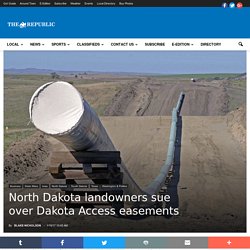
Already, landowners in Iowa await a state judge’s ruling in another easement case regarding the $3.8 billion, four-state pipeline. Other court battles are playing out in federal court in North Dakota and Washington, D.C. The Morton County landowners in the lawsuit, filed this month in U.S. District Court, are seeking more than $4 million in damages from Dakota Access LLC, a subsidiary of Texas-based Energy Transfer Partners. ETP contends the allegations “are without merit,” company spokeswoman Vicki Granado told The Associated Press.
Energy Transfer & Sunoco Announce Sale of Stake in Bakken Pipeline Project to Enbridge and Marathon Petroleum. DALLAS--(BUSINESS WIRE)--Energy Transfer Partners, L.P.
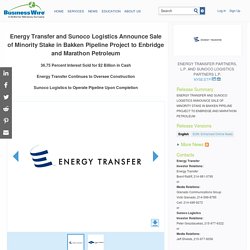
(NYSE: ETP) and Sunoco Logistics Partners L.P. (NYSE: SXL) today announced they have signed an agreement to sell 36.75% of the Bakken Pipeline Project, which includes the Dakota Access pipeline and the Energy Transfer Crude Oil pipeline, to MarEn Bakken Company LLC (“MarEn”), an entity jointly owned by Enbridge Energy Partners, L.P. and Marathon Petroleum Corporation (“MPC”), for $2 billion in cash. The sale is expected to close in the third quarter of 2016, subject to certain closing conditions. ETP and SXL will receive $1.2 billion and $800 million in cash at closing, respectively. As previously announced, the Bakken Pipeline entities have arranged a $2.5 billion project financing facility that is expected to provide substantially all of the remaining capital necessary to complete the project.
FACT: Extractive Industries Transparency Initiative 12.18.15. The United States this week published its first EITI Report, covering the fiscal year 2013.
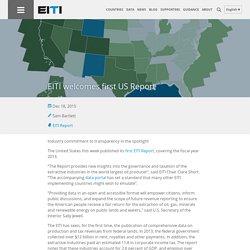
“The Report provides new insights into the governance and taxation of the extractive industries in the world largest oil producer”, said EITI Chair Clare Short. “The accompanying data portal has set a standard that many other EITI implementing countries might wish to emulate”. “Providing data in an open and accessible format will empower citizens, inform public discussions, and expand the scope of future revenue reporting to ensure the American people receive a fair return for the extraction of oil, gas, minerals and renewable energy on public lands and waters,” said U.S. World's Biggest PR Firm Quits American Oil Lobby. Perhaps you heard the good news—the world’s largest public relations firm, Edelman, just spun off an advertising subsidiary so that it could show a commitment to not aiding the denial of climate change science.

The Guardian explains how American Petroleum Institute’s (API) contracts with Edelman were so massive—tens of millions of dollars—that it was up to 10 percent of the PR giant’s income. For years, Edelman has managed multi-million dollar contracts with the API, using its Blue Advertising subsidiary to help API run commercials selling fantasies to people: that oil and gas are our only viable, plentiful, “AMERICAN” sources of energy. In the saga that led Edelman to dump the lobbyists at API, Greenpeace had a small role to play: we infiltrated a commercial shoot, run by Edelman’s Blue advertising arm for API. After being dressed up in a button-down, plaid orange shirt—I’m not sure what look they had in mind for me—I was put in front of the camera and told to repeat lines back. Mr. Exxon CEO Joins Lawsuit to Stop Fracking Near His Home.
The Climate Deception Dossiers: Internal Fossil Fuel Industry Memos Reveal Decades of Corporate Disinformation. For nearly three decades, many of the world's largest fossil fuel companies have knowingly worked to deceive the public about the realities and risks of climate change.
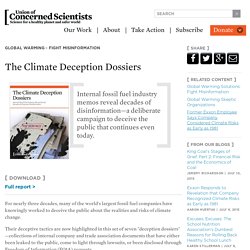
Their deceptive tactics are now highlighted in this set of seven "deception dossiers"—collections of internal company and trade association documents that have either been leaked to the public, come to light through lawsuits, or been disclosed through Freedom of Information (FOIA) requests. Each collection provides an illuminating inside look at this coordinated campaign of deception, an effort underwritten by ExxonMobil, Chevron, ConocoPhillips, BP, Shell, Peabody Energy, and other members of the fossil fuel industry.
UPDATE (July 9, 2015): As this report went to press, a newly discovered email from a former Exxon employee revealed that the company was already factoring climate change into decisions about new fossil fuel extraction as early as 1981. Learn more. The climate deception dossiers. Diluted Bitumen Information. A Study of Fate and Behaviour of Diluted Bitumen Oils on Marine Waters December 16, 2013 This document is a final report for a series of physical and chemical tests that were conducted on the fate and behaviour of diluted bitumen oils at a test facility in Gainford, Alberta.
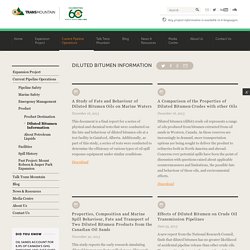
Data on Oil, Gas, Mining Projects Often Incomplete, Missing or Inaccessible. Data on Oil, Gas, Mining Projects Often Incomplete, Missing or Inaccessible Topics: Energy and Natural Resources Related Content: Information Access, Extractive Industries Transparency Initiative - EITI November 20, 2014 | By: Mia Steinle Finding data about the drilling and mining of oil, gas and minerals on public lands can be a difficult proposition, at best, and often leaves people who live and work in these areas with too little information on environmental impacts, worker safety, and company ownership and revenues, according to a survey of members of various communities across the country where extractive industry activities take place.
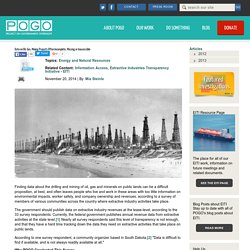
The government should publish data on extractive industry revenues at the lease-level, according to the 33 survey respondents. Pipeline Information and FOIA via Oil Attorneys. Increasing Requests for Disclosure Under FOIA. In light of recent high profile pipeline incidents, PHMSA, among other federal agencies, is experiencing an unprecedented number of requests for disclosure of information under the Freedom of Information Act (FOIA) at 5 U.S.C. 552, et seq.
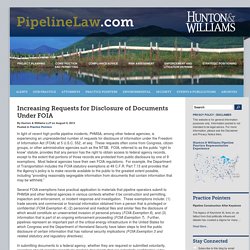
These requests often come from Congress, citizen groups, or other administrative agencies such as the NTSB. FOIA, referred to as the public “right to know” statute, provides that any person has the right to obtain access to federal agency records, except to the extent that portions of those records are protected from public disclosure by one of 9 exemptions. Most federal agencies have their own FOIA regulations. For example, the Department of Transportation includes the FOIA statutory exemptions at 49 C.F.R. Advocates Fight Oil Companies on Transparency. Advocates Fight Oil Companies on Transparency February 26, 2013 Major oil companies should stop fighting transparency laws that force extractive industries to disclose payments to governments, said Dominic Eagleton of Global Witness in an op-ed in The Huffington Post.

Global Witness is part of a large coalition seeking to increase transparency in the U.S. and abroad “[b]y encouraging extractive companies to publish accounts of the trillions of dollars they pay to governments for the world's oil, gas and minerals.” This coalition, known as the Extractive Industries Transparency Initiative (EITI), includes major oil companies like Chevron, BP and ExxonMobil, but those same companies are now trying to weaken reporting rules in the U.S. Read the rest of the article to find out why this initiative is so important and what the next steps are to increase transparency in extractive industries.
Andre Francisco is the Online Producer for the Project On Government Oversight.
BRIDGER LOGISTICS. ENERGY TRANSFER: DAKOTA ACCESS PIPELINE. ENBRIDGE: DAKOTA ACCESS PIPELINE. SUNOCO LOGISTICS: DAKOTA ACCESS PIPELINE. DAKOTA ACCESS, LLC. PHILLIPS 66 - DAKOTA ACCESS PIPELINE. MARATHON: DAKOTA ACCESS PIPELINE. MAREN BAKKEN COMPANY, LLC: DAKOTA ACCESS PIPELINE.